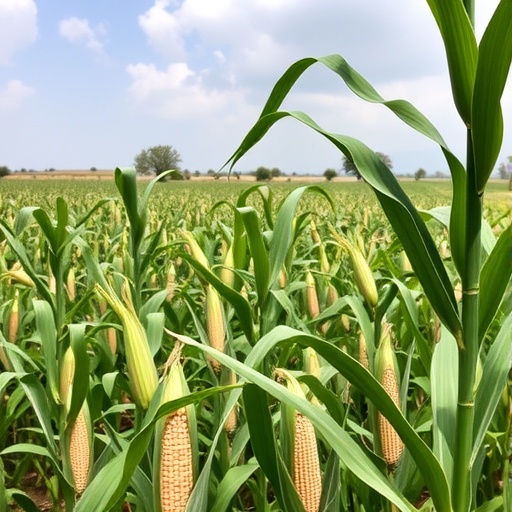In the ever-evolving discourse surrounding climate change, a new study sheds light on its tangible impacts on agricultural practices, specifically maize yield in Arba Minch, Ethiopia. The research, conducted by B.G. Reta, delves into the intricate relationship between climate variability and maize production, illustrating the challenging landscape that farmers must navigate in light of shifting weather patterns. Through rigorous analysis and field studies, Reta paints a comprehensive picture of how climate change is not just a distant concern, but a pressing reality impacting food security in developing regions.
As the planet warms, the consequences for agricultural outputs are dire. Reta’s investigation underscores the relationship between increasing temperatures and changes in rainfall patterns, which collectively threaten the fragile equilibrium of maize cultivation in Ethiopia. Long recognized as a staple food, maize serves as a dietary cornerstone for millions in the country, thus making the implications of its yield fluctuations particularly urgent. The study highlights temperature extremes and unpredictable precipitation as formidable adversaries that farmers face, often resulting in decreased productivity and increased vulnerability among communities reliant on this crucial crop.
The research also touches upon the systematic challenges posed by climate change, emphasizing the vulnerabilities inherent in the agricultural sector. Farmers in Arba Minch are experiencing a decline in their maize yields, which can be attributed to both erratic weather patterns and increased instances of drought. Moreover, these climatic changes exacerbate existing socio-economic disparities, placing marginalized communities at an even greater risk. The study calls for immediate attention to these issues, advocating for strategies that empower farmers to adapt to these new realities while ensuring that food security remains an attainable goal.
In response to the challenges identified, Reta proposes the implementation of mulching as an adaptive strategy to mitigate the adverse effects of climate change on maize yield. By maintaining soil moisture and temperature, mulching could provide a buffer against the increasingly erratic climatic conditions. The practical application of this technique entails covering the soil with organic materials, which not only improves soil fertility but also reduces water evaporation. Thus, farmers who adopt this method may be better positioned to sustain their yields, despite the unpredictability brought forth by climate change.
The study’s findings extended beyond just the practical recommendations for local farmers; they also provided insight into the socio-political implications of climate adaptation strategies. Reta emphasizes the need for local and national governments to create supportive policies that facilitate the adoption of agricultural practices like mulching. This includes providing farmers with the necessary resources, knowledge, and training required to effectively implement these techniques on their farms. Furthermore, collaboration among agricultural experts, local communities, and policymakers is vital in fostering an environment where sustainable practices can flourish amid climatic adversity.
Adopting mulching as a widespread practice could contribute to a more resilient agricultural system, enabling farmers to weather the storm of climate variability. The symbiotic relationship between improved agricultural practices and climate change resilience is pivotal in the quest for sustainable food production. Additionally, the study addresses the importance of enhancing farmers’ knowledge about sustainable agricultural practices, ensuring they understand the benefits and techniques associated with mulching, thereby reinforcing their capacity to adapt.
Ultimately, Reta’s work serves as a clarion call for urgent action. The intertwined challenges of climate change and food security cannot be overlooked, particularly in vulnerable nations reliant on agriculture for their livelihoods. By embracing innovative practices like mulching, agricultural sectors can bolster their defenses against the decreasing yields that threaten to undermine food security.
Moreover, the study highlights the vital role of ongoing research in this domain, advocating for continued exploration into the impacts of climate variability on crop production. The intricacies of agricultural resilience and climate adaptation should remain a priority on the global research agenda. By investing in studies that inform and guide local practices, we can collectively shift towards a more sustainable future in agriculture.
In conclusion, the implications of climate change on maize yield are profound, and the strategies proposed, such as mulching, offer pathways toward greater resilience in agriculture. Reta’s research is not merely an academic exercise; it serves as a vital contribution to a larger conversation about sustainability and food security in a changing world. As climates grow increasingly unpredictable, farming communities must find ways to adapt, and scientific inquiry will be essential in guiding and supporting those endeavors, securing a robust agricultural future for generations to come.
The conversation around climate change and agriculture is more relevant than ever, urging researchers, farmers, and policymakers alike to forge a cohesive framework that tackles these issues head-on. With concerted efforts and shared knowledge, it is possible to mitigate the impacts of climate change and ensure that staple crops like maize continue to thrive even in challenging conditions.
This research underscores a vital juncture where agricultural practices must evolve to meet the realities shaped by climate change. The recommendations presented by Reta offer practical steps that can empower local farmers while fostering a more resilient agricultural system. Only through a collaborative approach that embraces innovation, sustainability, and education can we hope to navigate the complexities of climate impact on food production.
As we look forward, it’s imperative that we prioritize resilient agricultural practices and develop comprehensive frameworks that address the intertwined challenges posed by climate change and food security. The potential for such approaches to yield lasting benefits calls for immediate and sustained action, all of which begins with research efforts like those undertaken by Reta in Ethiopia’s Arba Minch region.
Subject of Research: Climate Change Impacts on Maize Yield and Mulching Adaptation
Article Title: Assessing climate change impacts on maize yield and effects of mulching adaptation in Arba Minch, Ethiopia
Article References:
Reta, B.G. Assessing climate change impacts on maize yield and effects of mulching adaptation in Arba Minch, Ethiopia.
Discov Sustain 6, 1111 (2025). https://doi.org/10.1007/s43621-025-01968-2
Image Credits: AI Generated
DOI: 10.1007/s43621-025-01968-2
Keywords: Climate change, maize, yield, mulching, Ethiopia, agriculture, adaptation, food security.




